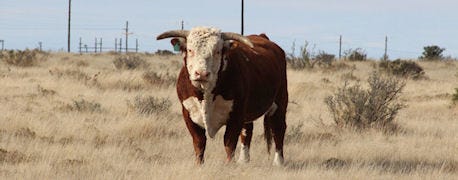April 13, 2015

A $100 investment in a bull can provide a big return now that October futures for 650-pound calves are hovering around $216 per hundredweight, said David Fernandez, Cooperative Extension Program livestock specialist at the University of Arkansas at Pine Bluff, with each calf born being worth $1,404.
Related: Are You Sure Your Herd Bull is Ready? County tests often available
A breeding soundness exam, or fertility test, and a trich test usually cost around $50 each.

A $100 investment in a fertility test (breeding soundness exam) and trich test for your herd bull could pay dividends in settled heifers and cows (Texas A&M Photo)
On deciding when to get a bull soundness exam, Fernandez advises beef producers to conduct these fertility tests on all bulls every year. It is not uncommon for a bull to test satisfactory after falling short of satisfactory earlier in the year.
Fernandez said on most farms, the breeding season for heifers begins in May. Young bulls under 18 months of age frequently fail a fertility test, yet mature into a sound breeder as they progress through puberty.
Older bulls may fail a breeding soundness exam because of injury or disease.
A veterinarian will examine the bull's feet and legs, eyes, mouth and teeth, and body condition. He or she also will examine the bull for any injuries that may make him unable to mate. Generally, between 10 to 20% of bulls fail a bull fertility test in a given year.
After the general exam, the veterinarian will measure the bull's scrotal circumference. Bulls with larger scrotal circumferences are more fertile and have daughters that are more fertile and mature earlier. The vet will also collect a semen sample and determine the percentage of motile sperm and normal sperm.
A bull must have at least 30% motile sperm with at least 70% normal sperm with a minimum scrotal circumference to be classified as a sound breeding bull. If your bull does not meet these criteria, have him tested again in 30 days, Fernandez said.
If the bull fails a fertility test, Fernandez says it's best to not pass him on to another beef producer.
Related: Livestock Industry Capitalizes on New Technology
"At one breeding soundness exam clinic, four out of five bulls brought in by one producer failed; the one that passed was the youngest and least likely to breed cows. Imagine what a poor calf crop would have resulted if the bulls that failed had not been culled," Fernandez said.
If purchasing a new bull, be sure he has passed a breeding soundness exam this year, and that he's negative for Trichomoniasis. Trich can cause very low fertility, low pregnancy rates, extended breeding seasons and low calf crops. The test takes several weeks so be sure to line up your new bull early enough for him to be tested, Fernandez said.
You May Also Like




